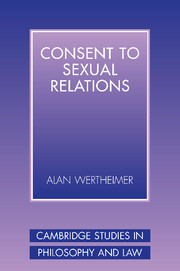Book contents
- Frontmatter
- Contents
- Preface
- Acknowledgments
- Abbreviations
- 1 Introduction
- 2 Law
- 3 The psychology of sex
- 4 The psychology of perpetrators
- 5 The harm and wrong of rape
- 6 The value of consent
- 7 The ontology of consent
- 8 Coercion
- 9 Deception
- 10 Competence
- 11 Intoxication
- 12 Sex and justice
- Appendix: Alphabetical list of hypothetical cases
- Index
2 - Law
Published online by Cambridge University Press: 04 March 2010
- Frontmatter
- Contents
- Preface
- Acknowledgments
- Abbreviations
- 1 Introduction
- 2 Law
- 3 The psychology of sex
- 4 The psychology of perpetrators
- 5 The harm and wrong of rape
- 6 The value of consent
- 7 The ontology of consent
- 8 Coercion
- 9 Deception
- 10 Competence
- 11 Intoxication
- 12 Sex and justice
- Appendix: Alphabetical list of hypothetical cases
- Index
Summary
Legal controversies
I begin with the law because it provides us with a rich and varied literature of statutes, cases, and scholarship that bring the central issues of the project into sharper relief, although the law's understanding of sexual consent must be sensitive to issues of evidence and standards of proof that are not entirely replicated in our moral thinking. And to begin with the law of sexual consent is to begin with the law of rape.
For many years, rape was defined by common law as sexual intercourse “by a man with a woman, not his wife, by force and against her will.” That definition found its way into the statutes of many states. There are three features of this definition worth noting: (a) the marital exclusion; (b) the force requirement; (c) the no-consent (or “against her will”) requirement. First, a man could not rape his wife, whatever the degree of force or absence of consent. Second, rape required the use or threat of physical force. If a man did not use or threaten physical force, he did not commit rape even if the sexual act was against a woman's (expressed) will or without her consent. Third, the phrases “by force” and “against her will” were supposedly regarded as jointly sufficient but independently necessary conditions. If a man used or threatened physical force, there was no rape if the woman consented to sexual relations, implying that the use or threat of physical force is not incompatible with the victim's consent.
- Type
- Chapter
- Information
- Consent to Sexual Relations , pp. 11 - 36Publisher: Cambridge University PressPrint publication year: 2003



